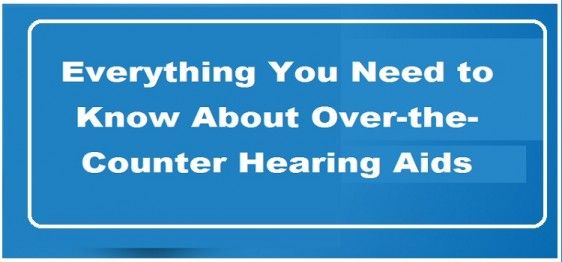If you are suffering from hearing loss or know someone with this difficulty, you already know about the high price tag of hearing aids. A pair of hearing aids can cost you up to $4000 US.
If you are suffering from hearing loss or know someone with this difficulty, you already know about the high price tag of hearing aids. A pair of hearing aids can cost you up to $4000 US. Unfortunately, Medicare or most of the private insurance companies don’t cover the expense of these devices often. Most people diagnosed with hearing loss backs up from buying hearing for this particular reason.
This phenomenon can be changed soon as the FDA is processing regulations for over-the-counter hearing aids. Once processed, this will significantly bring change in the pricing of hearing aids and make them more affordable. So, we have decided to give you all the necessary information on over-the-counter (OTC) hearing aids. Hope it helps in leading a healthy and fulfilling life while managing hearing difficulties.
How Do You Get Hearing Aids?
The recent practice of getting hearing aids can be a bit hectic. If you suspect that you are having difficulties in hearing, first, you should schedule a hearing test. An audiologist will evaluate your test and determine the type and severity of your hearing loss. This will give him an idea of how hearing loss is impacting your communication ability.
Then the audiologist will give you a medical clearance and schedule an appointment to discuss various types and styles of hearing aids that will be suitable for you. The audiologist will also discuss the technological advances of hearing aids and what you can get from them. Considering all the aspects, you and your audiologist decide which hearing will suit your needs.
Within three weeks from your hearing aid evaluation, you will need to come back for the hearing aid fitting. On that day, the device will be fitted according to your communication needs and ear specification. Also, you will be taught how to use the device effectively.
So, you got your hearing aid now and are scheduled to meet your audiologist to meet the Right-to-Return period. In that meeting, the audiologist will calibrate the device based on your feedback. You need to express all the concerns or issues that you have faced and make your device fine-tuned.
Once you are done with dispensing, you can schedule follow-ups for checking up your device or cleaning. Sometimes, you may need multiple visits to calibrate your device properly.
What are Over-the-Counter Hearing Aids?
Over-the-counter hearing aids are regular hearing aids that will be available directly to consumers. You can buy them without going through an audiologist via online outlets or retails. However, those rules are still to be determined by the FDA, and we cannot know for sure till the proposal is approved.
What we can definitely say is that OTC hearing aid will open a new era in the hearing aid industry. It will make the devices more affordable. One wouldn’t need any clearance from an audiologist or professional to buy these devices as well.
While there are certain benefits with OTC hearing aids, it is certainly a controversial topic. Members of different hearing health associations have voiced their concerns in this manner. They fear that unregulated devices may do more harm than good for the patients. Without calibrating the hearing aids properly, some people may damage their hearing further. It may make them give up on hearing aids altogether and bring further social and health complications.
On the other hand, the Hearing Loss Association of America is openly supporting the decision of a regulated market for OTP hearing aids. These regulations were supposed to be available to common folks by 2020. Due to the pandemic, the regulations were pushed back and are likely to publish them on 2022
Who Can Benefit from OTC Hearing Aids
OTC hearing loss is intended for people with mild to moderate hearing difficulties. Deciding what kind of hearing loss can be complicated. That’s why it is recommended to see a professional before. Also, it is possible to develop hearing loss as a symptom of underlying health conditions like heart disease or diabetes. So for safety and health concerns, it is wise to see an audiologist beforehand.
If your concern is if the OTC is right or wrong for you, here are a few signs that you may have a hearing loss of mild to a moderate degree.”
- You face difficulties in listening to high-frequency consonants.
- You ask people to repeat what they say frequently.
- You have difficulties in listening to whispers in crowded places.
- You may struggle to understand similar words.
- Subtle behavioral changes like increasing TV volume way too much or sitting next to a speaker
The OTC hearing aids are not intended for persons with severe hearing difficulties. They will need a much-sophisticated device with additional help.
Though the FDA has yet to approve OTC hearing aids, the time is not far. OTC can bring balance or chaos. Hearing aids will be available to everyone who can’t afford them now. On the other hand, it can worsen the condition if the volume is turned too high. Only time can tell if we are heading in the right direction or not.












*********3@nestvia.com
I think this is among the most significant information for me. And i am glad reading your article. But want to remark on few general things, The web site style is perfect, the articles is really excellent : D. Good job, cheers chochox